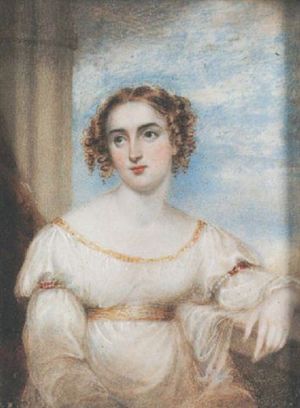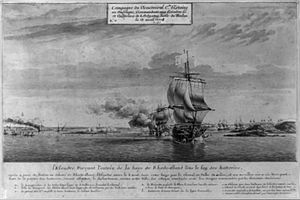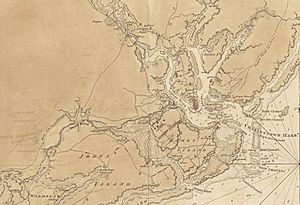Ann Bates facts for kids
Ann Bates (born around 1748 – died around 1801) was a brave and clever spy for the British during the American Revolution. She was from Philadelphia, Pennsylvania. People knew her for being smart, observant, and calm even in tough situations. She was often called "Mrs. Barnes" by others in her spy network.
Ann Bates was part of British General Clinton's spy team. She helped the British fight American forces between 1778 and 1780. She is most famous for her missions at George Washington's army camp in White Plains, New York, and during the Rhode Island Campaign.
Contents
Ann Bates' Early Life
Ann Bates was born in Pennsylvania around 1748. Before she became a spy, she worked as a schoolteacher in Philadelphia. To earn extra money, she also kept bees, raised sheep, and ran a small shop.
She was married to Joseph Bates. He was a soldier and fixed artillery for the British Army. Joseph Bates joined General Clinton's army in 1778. This was when the British left Philadelphia. The army then marched to New York City. Ann Bates later received her spy training there.
Ann Bates' Spy Career
Ann Bates used her cleverness to become a great spy. At that time, many people thought women didn't understand war. This helped her go unnoticed in American army camps. She often pretended to be a peddler, selling small items. This way, she could travel freely among the American soldiers. She is best known for her spy trips to George Washington's camp in White Plains, New York.
Joining the Spy Network
Ann Bates was first noticed by a civilian spy named John Craig. They met when the British were in Philadelphia. Craig was part of General Clinton's spy network. He gave Bates small secret tasks in Philadelphia. Craig quickly saw how smart she was. He suggested she meet with his general, Major Duncan Drummond, in New York City.
Ann Bates left Philadelphia on June 18, 1778. This was when British commander General Clinton moved his forces. She convinced General Benedict Arnold that she was leaving to sell her goods in New York City. After her husband joined Clinton's army, Bates followed the British to their base in New York City. There, she met with Major Drummond. He convinced her to join the British spy network.
Spying at Washington's Camp
On June 29, 1778, Bates left New York City for her first mission. She had only one day of training! She traveled to Washington's camp in White Plains, New York. There, she used the name "Mrs. Barnes." She knew a lot about the weapons used in the war. This helped her gather important information about American supplies and plans.
Her first goal was to find a disloyal soldier in Washington's camp. She hoped this soldier would give the British secret information. She didn't find one. So, she changed her plan. She listened to conversations and counted the cannons in the camp. At George Washington's camp, American troops were planning the Rhode Island Campaign. She gathered valuable details about American movements toward Rhode Island.
On her way back to New York City, she was stopped by American soldiers. She was arrested and held overnight. But she was released the next morning. When she finally returned to New York City, she shared all the information she had gathered with Major Drummond. She reported that the Americans had fewer weapons than the British thought. Major Drummond was very impressed with her work and memory.
Even after a stressful mission, Bates wanted to go back to White Plains. She made three trips to the camp in total. She gathered information that helped the British fight American efforts in the Battle of Rhode Island. On her third mission, she learned that 600 boats were preparing to attack Long Island. Bates gave specific details about the number of troops heading to attack British forces there.
In September 1778, she was on another mission. A British soldier who had left the army recognized her. But she managed to escape being captured. She then traveled through a series of safe houses. These were secret places for women spies to hide. She later wrote about seeing the entire American army. She noted the strength of each group and how many cannons they had.
Close Calls and New Missions
During her last mission in White Plains, Ann Bates saw a former British soldier. She thought he might report her. So, she quickly left the American camp. She went straight back to New York. On her way, she traveled through New Jersey. She stayed in safe houses used by Loyalists. These safe houses helped many British prisoners escape American camps.
Bates wanted to get back to British lines quickly. She feared her cover would be discovered. On September 26, 1778, she was found at an American headquarters. This American unit had over 5,000 troops. It was led by General Charles Scott, who was Washington's chief of intelligence. Scott questioned her. Bates told him she was "a Soldier's wife" who had forgotten something. She was eventually let go. But she was shaken by the experience.
After she returned to New York City, Major Drummond took her to Long Island. He worried she might run into American forces again. A few days later, they returned to Manhattan. Drummond asked her to meet a friend of Benedict Arnold's near Philadelphia. This shows that Benedict Arnold was involved with the Loyalist spy network early on.
Between October 1778 and August 1779, Bates didn't spy much. This was because Major Drummond was sent back to England. Major John André took his place. André is famous for working with the American traitor, Benedict Arnold. In April 1780, Ann's husband, Joseph Bates, was sent to Charleston, South Carolina. Ann traveled with him. However, she did not take part in any more spy work while in Charleston.
Ann Bates' Legacy
On March 6, 1781, Ann Bates and her husband sailed for England. She is remembered as a smart and important spy for the British during the American Revolution. Her busy spy career and money troubles put a strain on her marriage. Joseph left her soon after they arrived in England.
Even so, Bates was proud of her role after the war. In 1785, she asked the British government for a pension. She wrote that her information helped save the Rhode Island garrison. She believed her actions saved troops and supplies from being captured. Major Drummond's papers and her own memories helped her get a pension. Ann Bates' exact death date was not recorded. It is thought she died in England.
Ann Bates is played by Tina Benko in the AMC TV series, Turn: Washington's Spies.




